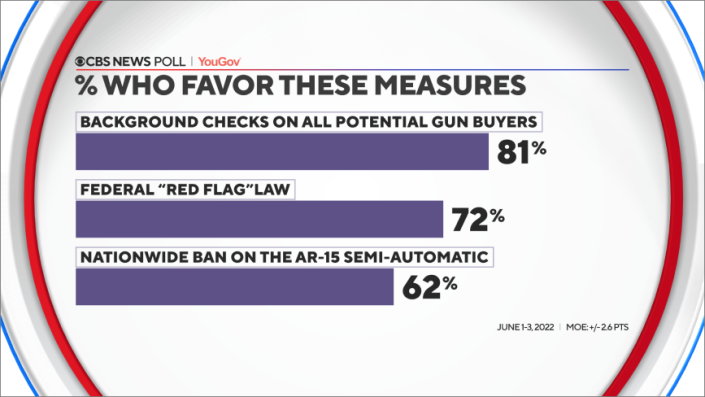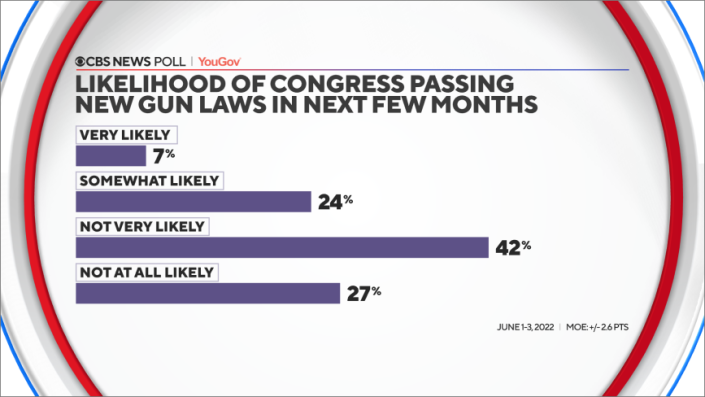[ad_1]
Most People in america carry on to favor stricter gun regulations, but truly feel that getting them passed is stymied by significant cash and inaction by politicians. And Us residents say the nation’s gun discussion — no subject where by they stand on it — is influenced far more by partisanship than public basic safety. Polling reveals they are partly proper.
There is bipartisan aid for measures that are used to people — this sort of as background checks and a federal “purple flag” legislation, which most People in america consider could do a lot to help prevent mass shootings. But there are extra partisan variances around what to do about the guns them selves.
Democrats glance for more gun limitations — like banning AR-15s — and much less persons getting guns in standard, and also support background checks and additional psychological wellbeing products and services. But Republicans have a tendency to oppose AR-15 bans and really feel that permitting additional folks to have guns and much more armed safety would prevent mass shootings. They consider that these steps, alongside with improved mental health and fitness screening, would be most powerful in protecting against mass shootings.
Americans all round overwhelmingly imagine mass shootings can be prevented, if we consider. But Republicans, in particular, are much less possible to think so — 4 in 10 Republicans say mass shootings are, regretably, anything we have to accept in a cost-free culture.
In all, most do not assume Congress to pass any important improvements to gun coverage in the coming months.

In the chart under, we see equally substantial help across get-togethers for background checks, a little bit less but nevertheless most for a federal crimson flag law, and then, we see Republicans very distinctive from independents and Democrats on banning AR-15s.


Why does the U.S. have so several mass shootings?
The large greater part of People consider we could avoid mass shootings if we seriously experimented with, though Republicans are considerably less very likely to hold that look at.

We questioned persons why they assume there are more mass shootings in the U.S. than in quite a few other nations, and far more availability of guns is the top answer amid Us citizens total. Right here all over again, we see partisan divides with only about a quarter of Republicans citing guns as a purpose. A lot more individuals with psychological overall health troubles in the U.S. is their best remedy, followed by the influence of violent motion pictures and video online games.

Democrats see gun-linked goods, this kind of as additional history checks and banning semi-automatic weapons, as insurance policies that would do “a whole lot” to aid protect against mass shootings. Republicans think greater mental health and fitness procedure, armed protection and extra faith in people’s lives would be additional helpful.


So, what quantity of gun ownership will make The united states safer? That, much too, breaks together partisan strains.

Seventy-two % of Democrats imagine the U.S. would be safer if fewer people today — or if no 1 — experienced guns. By distinction nearly 50 % of Republicans — 46% — believe the U.S. would be safer if far more people today — or absolutely everyone — had guns.

Other gun coverage steps
One particular measure that is becoming debated is increasing the age requirement for obtaining semi-automatic weapons. A the vast majority of People in america believe the minimum age to buy a semi-automatic weapon like an AR-15 must be at the very least 21, like most Republicans.

Aid for stricter laws covering the sale of guns has inched up some. It’s a pattern we’ve observed in CBS News polling prior to, where by support for far more rigid gun guidelines in some cases has long gone up following a mass capturing, but has ticked again down afterward over time.


In general, 76% of Us residents say factors in the nation are likely poorly, a variety that has ongoing to increase and now matches its highs from the early months of the pandemic in 2020.
This CBS News/YouGov study was conducted with a nationally representative sample of 2,021 U.S. adult inhabitants interviewed involving June 1-3, 2022. The sample was weighted in accordance to gender, age, race, and instruction centered on the U.S. Census American Local community Survey and Present-day Populace Survey, as well as to 2020 presidential vote. The margin of mistake is ±2.6 points.
NIH health practitioner calls prolonged COVID a “important challenge for the state heading ahead”
Economist Betsey Stevenson on the labor market place, inflation and economic recovery
Schiff phone calls DOJ conclusion not to demand 2 Trump aides “deeply troubling”
[ad_2]
Supply website link




More Stories
Kashmir Dispute: How It All Began
How the Partition Sparked Decades of Conflict in Kashmir
5 Online Learning Management Systems That Deliver Results